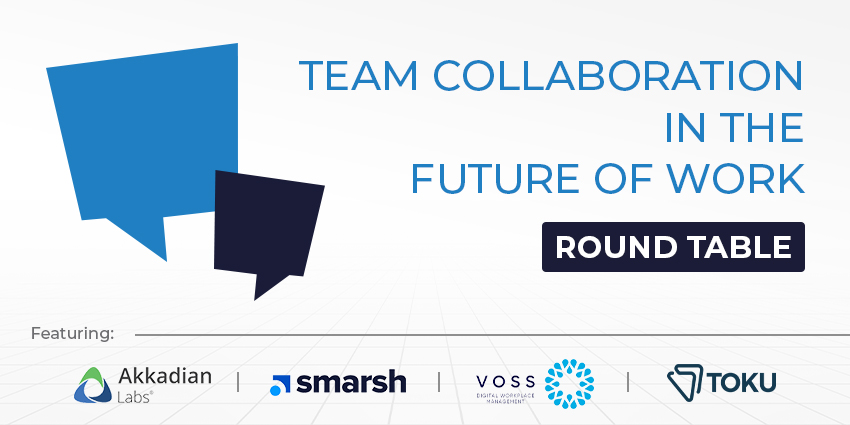Companies and organisations have had to cope with significant workplace changes in the last few years. The UC and collaboration space seems best placed to solve these issues with technological solutions, whether standalone, part of a mesh of integration or used in tandem with other systems. But do we accept that hybrid is here to stay, and if so, what do business leaders do about that?
Presenting our latest Round Table topic, “Team Collaboration in the Future of Work“, we spoke with experts from Akkadian Labs, Toku, Smarsh and VOSS Solutions to discuss the developments in the work environment and how far technology can go to solve the problems that arise. We discuss the concerns of business leaders regarding productivity, the use of office space, restoring social capital and how we deal with workforce expectations for 2023 and beyond.
How can tech solve the issue of business leaders’ concerns over productivity?

David Levy, Director of Marketing, Akkadian Labs
Akkadian Labs David Levy believes effortless communication is required to maximise productivity in today’s hybrid work environment. But how will business leaders be able to achieve this?
“UC platforms can seamlessly enable collaboration across multiple applications such as voice, messaging, video conference, webinars and call centre; and error-free deployment of these apps is critical to assure adoption.”
“Also, automated UC provisioning software is a key tool in managing your UC estate.”
Bill Dellara, Vice president, Product, VOSS Solutions
For VOSS Solutions’ Bill Dellara, visibility is key. With a lot of talk about physical presence to deliver productivity in the workplace, Dellara believes this can be achieved remotely using the right technology.
“For organisations to ensure productivity from a dispersed workforce, their staff must have immediate and seamless access to the UC tools they need to do their job effectively. But most importantly, the organisation can see — in real-time — how staff use these tools to understand staff experience and keep a close eye on productivity.
“UC automation management coupled with UC performance management gives the ability to solve any UC issues before it becomes apparent to the employee and before it becomes serious enough to impact morale or productivity. Actionable intelligence allows the organisation to proactively solve any performance-impacting outage or service degradation, allowing staff to remain efficient and productive, regardless of location.”
CEO and Founder at Toku
“While technology can enable organisations to optimise productivity, it should always be done as part of a holistic approach that includes people and process changes too,” says Toku’s founder Thomas Laboulle.
“Hybrid working arrangements are an excellent example of changing environments where teams suddenly need to balance their time between the office space and other remote working locations. Using technology to ensure that information is easily accessible from everywhere to enhance collaboration will only get you so far.”
Laboulle recommends business leaders focusing on data:
“Beyond access to information, data integrations and smart processes, leaders must reflect on productivity measurement and tracking using tech that centralises data and provides reports automatically.”
“There will also be an increased need for integrations between corporate tools (e.g., CRM) and other databases via the cloud.
“Furthermore, installing smart rotation systems will guarantee that you are not creating additional friction points and complexity. Sometimes it just makes sense to have a hands-on, face-to-face workshop.”
How can Team Collaboration technology solutions help enterprises optimise empty offices and property portfolios?

Bill Dellara, Vice president, Product, VOSS Solutions
The pandemic has forever changed employee working practices, and Dellara’s view is that businesses need to do more.
“For organisations to attract the best talent, they must be able to offer much more flexible contracts than before. This means that office space will need to evolve too.”
“Fewer employees require fixed desk space, freeing office real estate for more huddle rooms, as the desire grows for staff to meet and collaborate when they are in the office together.”
While UC technology is evolving rapidly, fixed desk phones have become less necessary, with agile connectivity at hot desks much more of a priority. Dellara thinks that meeting room tech is, therefore essential.
“Huddle space and meeting room setups require office-based staff to easily collaborate with remote workers to avoid an ‘us’ and ‘them’ culture, so the latest meeting room technology, headsets, video, and collaboration tools are a must.
“All of this needs to be managed by a UC automation and performance management platform to ensure experience and monitor productivity.”
CEO and Founder at Toku
Today’s working environment demands that businesses make allowance for both in-office and remote team collaborations to occur seamlessly. Laboulle believes this is because most businesses are adopting a hybrid model for remote working now.
“So rather than optimise for empty office space, there needs to be more conversation around how we optimise for productive team collaborations in a hybrid working environment in a way that is more cost-effective.
“For example, you can make life easier for your team by enabling telephone calls within Microsoft Teams. So, whether a team member is working remotely or in the office, they will be able to make and receive calls from anywhere, on any device, directly within the MS Teams console.
“When you use tech to unify your team communications this way, you are effectively optimising your resources for a hybrid working environment.”
David Levy, Director of Marketing, Akkadian Labs
The current situation means companies and organisations cannot get around the reduced need for office space in Levy’s view.
“There is no going back to 100% of employees in-office all the time, and a diverse set of communication tools is required to facilitate collaboration.”
He said about organisations utilising their assets: “Hoteling/flexible workspaces are necessary to optimise office/property portfolios in a hybrid work environment.”
How do you see vendors helping to restore lost ‘social capital’ of employees not being around each other and assisting companies looking to improve their cultures to keep them?

Laboulle’s view is that vendors can help by adding more features that emphasise the ‘human interaction’ element into their software.
“For example, in many leading collaboration tools, video calling allows you to see others’ facial expressions and have a richer, more engaging human interaction.
“In line with this, I’ve seen some interesting features recently that make discussions more natural and enjoyable. Some have modes that simulate the feeling of sitting together in a meeting room so that it is easier to feel closer to your team members.”
Toku’s CEO points to better interaction and engagement through more modern means: “There are also more interactive options like polls, emoji reactions, sticky notes, etc. that give the team more ways to engage in a discussion beyond just speaking or typing.
“These features, and more can help restore lost ‘social capital’ to some extent. However, they won’t completely replace the human element, which is why a hybrid working model is still necessary.”
David Levy, Director of Marketing, Akkadian Labs
Levy’s view is that tightly integrated UC apps can simulate the random interactions of an office environment. Additionally, he believes that responsibility starts at the top:
“Senior management needs to set the example for app utilisation — in other words, build the culture of remote collaboration.”
“To this end, ease of use, security, uptime and interoperability are critical.”
Bill Dellara, Vice president, Product, VOSS Solutions
Dellara feels there is a way forward, something he has learned from his experience.
“I’ve been remote working for more than ten years and feel incredibly close to my colleagues, and I’m also made to feel like a valued member of the team. So, it is possible.
“I believe that a seamless collaboration experience is a key to success. By having all the UC tools available to you — instant access to your colleagues through chat functionality, using huddle rooms and messaging boards for ongoing discussions, harnessing video technology for regular face-to-face meetings — all employees can feel they are contributing, regardless of their location.”
Importantly, Dellara feels that this is — often a multi-vendor mesh of technology — must be delivered as a seamless experience, which requires highly automated UC management.
“Having performance management tools that give real-time actionable intelligence is crucial. As soon as the UC service degrades or employees experience downtime, you’re in trouble.”
Regarding technological assistance, Mark Zuckerberg and Satya Nadella say ‘more with less. Elon Musk wants his workforce present in the office. How should modern work develop over the next 12 months for large enterprises?
Shaun Hurst, Principal Regulatory Advisor, Smarsh

Consultant at Smarsh Shaun Hurst gives an overview of how business leaders should approach the next twelve months.
“Take note of your current technology investments, and get a deeper understanding of their capabilities. Have a meeting with your vendor representative to collaborate on ideas for making the most of the products you have already invested in, and understand the full feature set and capabilities. Ask about training or enablement programs.”
Hurst brings it down to the simple fact that sometimes tech isn’t being used to its full potential.
“Our customers often don’t realise the full extent of our platforms’ capabilities, features and functions that they have already paid for.”
Bill Dellara, Vice president, Product, VOSS Solutions
Dellara at VOSS thinks the horse has bolted and that the landscape for workers has changed.
“Employees now expect a flexible approach to hybrid working, and to attract the best talent, you need to support a dispersed workforce.
“So, your UC estate must give employees a seamless experience, regardless of location. When staff are in the office, they should be able to connect and collaborate immediately, with flexible hotdesking and hi-tech meeting rooms. When working remotely, staff should have instant access to all the UC tools they need and connect and collaborate with colleagues at the touch of a button.”
As for the immediate future, Dellara advises: “If organisations invest in UC automation and performance management technology, they will be able to quickly roll out new technology and automate day-to-day MACDs, while keeping an eye on employee productivity and experience. And then it won’t matter whether your staff are at home or the office. They will be productive and happy, and your business will flourish.”
David Levy, Director of Marketing, Akkadian Labs
Levy believes hiring the best knowledge workers will necessitate flexibility in presence requirements.
” Knowledge management systems powered by UC tools and AI can support optimal collaboration and a distinct culture with a distributed, hybrid workforce.”
He concludes by issuing a forecast beyond even 2023: “Next-generation metaverse systems will become the norm in 2-4 years.”
CEO and Founder at Toku
Presence is key for Laboulle: “I am a huge believer in serendipitous encounters, where unexpected, unplanned things can happen only in a physical workplace setting. These opportunistic touchpoints contribute to building a sense of camaraderie amongst team members, provide additional leadership exposure and help to avoid proximity bias.”
However, Toku plans to keep hybrid work as the standard arrangement for 2023 and the foreseeable future. Laboulle explains: “We believe that hybrid work will be part of the benefits that prospective employees are looking for in their job search. This applies not just to scale-ups like Toku, but large enterprises as well.”







